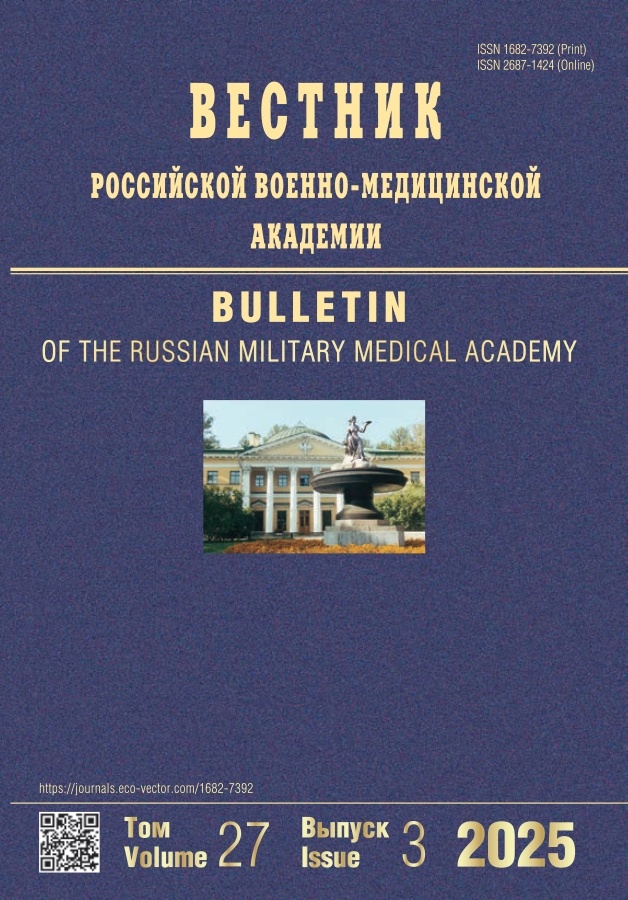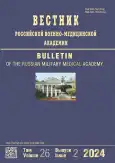Non-lipid genetic predictors of the development of coronary heart disease and myocardial infarction in patients with hypertension
- Authors: Tyuryupov M.S.1, Shulenin K.S.1, Cherkashin D.V.1, Sveklina T.S.1, Kutelev G.G.1, Mirzoev N.T.1
-
Affiliations:
- Kirov Military Medical Academy
- Issue: Vol 26, No 2 (2024)
- Pages: 197-206
- Section: Original Study Article
- URL: https://journals.rcsi.science/1682-7392/article/view/267235
- DOI: https://doi.org/10.17816/brmma626848
- ID: 267235
Cite item
Abstract
The associations between the main non-lipid genomic biomarkers and coronary heart disease occurrence and the unstable course of the disease with the development of myocardial infarction in 164 patients with stage I–III hypertension were investigated. The study was conducted in two stages. At the first stage, the non-lipid genetic predictors of coronary heart disease were determined without considering the characteristics of its clinical course. At the second stage, the possibility of identifying genetic predictors of the complicated course of coronary heart disease with the development of myocardial infarction was studied. In hypothesis testing, the difference was considered significant at p < 0.05. It was found that the presence of coronary heart disease in patients with hypertension was associated with a significant predominance of genetic biomarkers in four single-nucleotide polymorphisms: in the hemostasis system (4G4G SERPINE 1), pro-inflammatory cytokines (T allele IL-1b-511, C allele IL-1b-1473), and innate immunity (FF TLR3-412). The development of myocardial infarction was associated with two genetic polymorphisms: pro-inflammatory cytokine system (CC IL-6-174) and hemostasis (4G4G SERPINE 1). In general, among the single-nucleotide polymorphisms studied, statistically significant results in predicting coronary heart disease were demonstrated by genetic biomarkers of the hemostatic system, pro-inflammatory cytokines, and innate immunity. In relation to myocardial infarction, genetic biomarkers of the hemostatic system and pro-inflammatory cytokines may have prognostic value. The use of genetic biomarker data as unfavorable prognosis predictors in patients with hypertension enables better risk stratification and assessment of the prognosis in these patients, which will significantly reduce the costs of conducting a genome-wide study.
Full Text
##article.viewOnOriginalSite##About the authors
Mark S. Tyuryupov
Kirov Military Medical Academy
Author for correspondence.
Email: mark.tfyuryupov@icloud.com
ORCID iD: 0000-0002-8366-0594
SPIN-code: 2886-7181
residency student
Russian Federation, Saint PetersburgKonstantin S. Shulenin
Kirov Military Medical Academy
Email: mark.tfyuryupov@icloud.com
ORCID iD: 0000-0002-3141-7111
SPIN-code: 8476-1052
MD, Dr. Sci. (Med.), associate professor
Russian Federation, Saint PetersburgDmitry V. Cherkashin
Kirov Military Medical Academy
Email: mark.tfyuryupov@icloud.com
ORCID iD: 0000-0003-1363-6860
SPIN-code: 2781-9507
MD, Dr. Sci. (Med.), professor
Russian Federation, Saint PetersburgTatyana S. Sveklina
Kirov Military Medical Academy
Email: sveklina@rambler.ru
ORCID iD: 0000-0001-9546-7049
SPIN-code: 3561-6503
MD, Cand. Sci. (Med.), associate professor
Russian Federation, Saint PetersburgGennady G. Kutelev
Kirov Military Medical Academy
Email: mark.tfyuryupov@icloud.com
ORCID iD: 0000-0002-6489-9938
SPIN-code: 5139-8511
MD, Dr. Sci. (Med.)
Russian Federation, Saint PetersburgNikita T. Mirzoev
Kirov Military Medical Academy
Email: mark.tfyuryupov@icloud.com
ORCID iD: 0000-0002-9232-6459
SPIN-code: 9826-5624
residency student
Russian Federation, Saint PetersburgReferences
- Visseren FLJ, Mach F, Smulders YM, et al. 2021 ESC Guidelines on cardiovascular disease prevention in clinical practice: Developed by the Task Force for cardiovascular disease prevention in clinical practice with representatives of the European Society of Cardiology and 12 medical societies with the special contribution of the European Association of Preventive Cardiology (EAPC). Rev Esp Cardiol (Engl Ed). 2022;75(5):429. doi: 10.1016/j.rec.2022.04.003
- Li Y, Zhong X, Cheng G, et al. Hs-CRP and all-cause, cardiovascular, and cancer mortality risk: A meta-analysis. Atherosclerosis. 2017;259:75–82. doi: 10.1016/j.atherosclerosis.2017.02.003
- Lawler PR, Bhatt DL, Godoy LC, et al. Targeting cardiovascular inflammation: next steps in clinical translation. Eur Heart J. 2021;42(1):113–131. doi: 10.1093/eurheartj/ehaa099
- Quispe R, Michos ED, Martin SS, et al. High-sensitivity c-reactive protein discordance with atherogenic lipid measures and incidence of atherosclerotic cardiovascular disease in primary prevention: the aric study. J Am Heart Assoc. 2020;9(3):e013600. doi: 10.1161/JAHA.119.013600
- Batra G, Ghukasyan Lakic T, Lindbäck J,et al. Interleukin 6 and Cardiovascular Outcomes in Patients With Chronic Kidney Disease and Chronic Coronary Syndrome. JAMA Cardiol. 2021;6(12): 1440–1445. doi: 10.1001/jamacardio.2021.3079
- Khasanjanova F, Tashkenbaeva E, Khaydarova D. The role of the IL-IB 3953 C/T gene in the development of unstable angina in young age men depending on the cytokine status. Joumal of Cardiorespiratory Research. 2021;2(4):63–66. doi: 10.26739/2181-0974-2021-4-14
- Kapelouzou A, Giaglis S, Peroulis M, et al. Overexpression of toll-like receptors 2, 3, 4, and 8 is correlated to the vascular atherosclerotic process in the hyperlipidemic rabbit model: the effect of statin treatment. J Vasc Res. 2017;54(3):156–169. doi: 10.1159/000457797
- Nakajima A, Libby P, Mitomo S, et al. Biomarkers associated with coronary high-risk plaques. J Thromb Thrombolysis. 2022;54(4): 647–659. doi: 10.1007/s11239-022-02709-2
- Asif M, Bhat S, Nizamuddin S, Mustak MS. TG haplotype in the LRP8 is associated with myocardial infarction in south Indian population. Gene. 2018;642:225–229. doi: 10.1016/j.gene.2017.10.037
- Meshkov A, Ershova A, Kiseleva A, et al. The LDLR, APOB, and PCSK9 variants of index patients with familial hypercholesterolemia in Russia. Genes (Basel). 2021;12(1):66. doi: 10.3390/genes12010066
- Tzveova R, Yaneva-Sirakova T, Naydenova G, et al. Polymorphic variant rs11206510 in pcsk9 and risk of coronary artery disease in bulgarians. Acta Medica Bulgarica. 2023;50(1):19–26. doi: 10.2478/amb-2023-0003
- Small AM, Huffman JE, Klarin D, et al. PCSK9 loss of function is protective against extra-coronary atherosclerotic cardiovascular disease in a large multi-ethnic cohort. PLoS One. 2020;15(11):e0239752. doi: 10.1371/journal.pone.0239752
- Andersen L, Estrella L, Andersen R. LDLR variant databases and familial hypercholesterolemia population studies. J Am Coll Cardiol. 2017;69(6):754–755. doi: 10.1016/j.jacc.2016.09.988
- Arca M, Zuliani G, Wilund K, et al. Autosomal recessive hypercholesterolaemia in Sardinia, Italy, and mutations in ARH: a clinical and molecular genetic analysis. Lancet. 2002;359(9309): 841–847. doi: 10.1016/S0140-6736(02)07955-2
- Liu Y, Cheng J, Guo X, et al. The roles of PAI-1 gene polymorphisms in atherosclerotic diseases: A systematic review and meta-analysis involving 149,908 subjects. Gene. 2018;673:167–173. doi: 10.1016/j.gene.2018.06.040
- Gonchar AL, Mosse I, Ivanov A, et al. Association of the pai-1 polymorphism and factor v leiden mutation with genetic predisposition to myocardial infarction. Molekulyarnaya i prikladnaya genetika. 2009;9:114–120. (In Russ.) EDN: ZYYIUP
- Bayramoglu A, Bayramoglu G, Urhan Kucuk M, et al. Genetic variations of renin-angiotensin and fibrinolytic systems and susceptibility to coronary artery disease: a population genetics perspective. Minerva Cardiol Angiol. 2022;70(1):16–24. doi: 10.23736/S2724-5683.20.05212-3
- Gogu AE, Motoc AG, Stroe AZ, et al. Plasminogen activator inhibitor-1 (pai-1) gene polymorphisms associated with cardiovascular risk factors involved in cerebral venous sinus thrombosis. Metabolites. 2021;11(5):266. doi: 10.3390/metabo11050266
- Kapustin SI, Sidorova JYu, Shmeleva VM, et al. The features of allele polymorphism of several hemostasis genes in patients with deep vein thrombosis complicated by pulmonary embolism. The Bulletin of Hematology. 2017;13(4):37–42. EDN: MVMASL
- Zhou L, Cai J, Liu G, Wei Y, Tang H. Associations between interleukin-1 gene polymorphisms and coronary heart disease risk: a meta-analysis. PLoS One. 2012;7(9):e45641. doi: 10.1371/journal.pone.0045641
- Rai H, Sinha N, Kumar S, et al. Interleukin-1 gene cluster polymorphisms and their association with coronary artery disease: separate evidences from the largest case-control study amongst north indians and an updated meta-analysis. PLoS One. 2016;11(4):e0153480. doi: 10.1371/journal.pone.0153480
- Zakharyan EA, Gritskevich OY. Impact of the single-nucleotide polymorphism of genes il1β, edn1, and nos3 genes on the individual genetic profile of patients with coronary heart disease in the republic of crimea. The Bulletin of Contemporary Clinical Medicine. 2023;16(6): 31–36. EDN: PMHYEQ doi: 10.20969/ VSKM.2023.16(6).31-36
- Ren H, Zhang Y, Yao Y, et al. Association between the interleukin-6 genetic polymorphism 174 G/C and thrombosis disorder risk: Meta-analysis of 10,549 cases and 19,316 controls. Medicine (Baltimore). 2016;95(27):e4030. doi: 10.1097/MD.0000000000004030
- Rai H, Colleran R, Cassese S, et al. Association of interleukin-6 -174 G/C polymorphism with coronary artery disease and circulating IL-6 levels: a systematic review and meta-analysis. Inflamm Res. 2021;70(10–12):1075–1087. doi: 10.1007/s00011-021-01505-7
- Santos CNO, Magalhães LS, Fonseca ABL, et al. Association between genetic variants in TREM1, CXCL10, IL4, CXCL8 and TLR7 genes with the occurrence of congenital Zika syndrome and severe microcephaly. Sci Rep. 2023;13(1):3466. doi: 10.1038/s41598-023-30342-3
- Ceylan AC, Çavdarlı B, Ceylan GG, et al. Impact of inflammation-related genes on covid-19: prospective study at turkish cohort. Tohoku J Exp Med. 2023;261(3):179–185. doi: 10.1620/tjem.2023.J071
- Silva MJA, Silva CS, da Silva Vieira MC, et al. The Relationship between TLR3 rs3775291 Polymorphism and Infectious Diseases: A Meta-Analysis of Case-Control Studies. Genes (Basel). 2023;14(7):1311. doi: 10.3390/genes14071311
- Stefik D, Vranic V, Ivkovic N, et al. Potential Impact of Polymorphisms in Toll-like Receptors 2, 3, 4, 7, 9, miR-146a, miR-155, and miR-196a Genes on Osteoarthritis Susceptibility. Biology (Basel). 2023;12(3):458. doi: 10.3390/biology12030458
- Chen Y, Lin J, Zhao Y, et al. Toll-like receptor 3 (TLR3) regulation mechanisms and roles in antiviral innate immune responses. J Zhejiang Univ Sci B. 2021;22(8):609–632. doi: 10.1631/jzus.B2000808
- Cooke G, Kamal I, Strengert M, et al. Toll-like receptor 3 L412F polymorphism promotes a persistent clinical phenotype in pulmonary sarcoidosis. QJM. 2018;111(4):217–224. doi: 10.1093/qjmed/hcx243
Supplementary files










